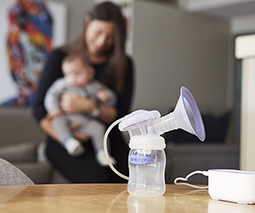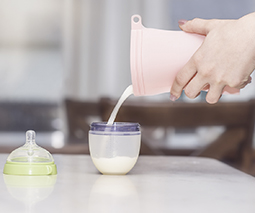Delayed arrival: When your breast milk comes in late

Early breastfeeding can be a tricky time as you and your baby get used to your new feeding relationship. Feeding often, encouraging a deep latch and ensuring your feeding position is optimal for breastfeeding are all things that will help your breasts to start producing mature milk within a few days after your baby is born.
Usually this mature milk will arrive 2-5 days after the birth, however there are times when women experience a delay in their mature milk arriving, which can affect your baby’s weight gain and overall health. Although this can be a stressful time, the thing to remember with delayed milk onset is that it’s generally a temporary situation that can be overcome with the right support. Here is what you need to know …
How your breastmilk arrives
Your breasts have been making colostrum since mid-pregnancy and your baby is able to access this right after birth, which is ideal for his brand new stomach and digestive system.
Your mature milk is triggered hormonally (it happens automatically after the birth), however if you are feeding your baby often and offering plenty of skin-to-skin contact right after birth, your milk production is likely to be higher when it does arrive. This will mean good things for your baby’s weight gain and helping you to establish and maintain your supply early on.
Mature milk arriving is often described as your ‘milk coming in’, and you’ll notice fullness and tenderness in your breasts when it happens.
Read more about early breastfeeding:
- 7 thoughts you might have when you first start breastfeeding
- How to prepare yourself for breastfeeding
- 5 ways breastfeeding is like starting a new job
Sometimes there is a delay
While many mums will experience their milk coming in around day three after the birth, for some mums there can be a delay of up to five days before they notice their breasts feeling full. It’s not always obvious when your milk is delayed, but you can look to your baby for clues, says Meg Nagle, International Board Certified Lactation Consultant (IBCLC) and blogger at The Milk Meg.
“Basically if your baby is showing signs that they are not getting enough milk then it’s possible your milk is taking a bit longer to come in than what we generally expect (within 2-3 days following birth).” Possible signs your baby may not be getting enough milk after the birth include weight loss and a lack of wet nappies.

Risk factors for milk delay
There are many risk factors associated with delayed milk onset, including having a caesarean section, being separated from your baby after birth, and the use of certain medications during labour, but none of these are conclusive – and you’d be better off being guided by other things when it comes to your breast milk, says Meg.
“You can have many medications during labour, have a caesarean and be separated from your baby and still have your milk come in within 24-48 hours!” says Meg.”What’s more important is knowing what to look out for in your baby to make sure they are getting enough breast milk. Listen to your baby and listen to your motherly instincts.”
Don’t panic
If your baby isn’t able to access mature milk from you there is a chance his weight will fall too low and your caregivers may suggest supplementing while your milk is still on its way. For some women this can be disappointing as supplementing may not have been part of their feeding plans. However, if this happens to you, try not to be discouraged. Many mums have been able to establish breastfeeding successfully after an initial delay in their milk onset, and while this might involve some supplementing in the beginning, it is entirely possible to exclusively breastfeed once any issues have been resolved.
“If your baby is showing signs that they are not getting enough breastmilk then it will be important to have someone assess your baby’s ability to remove the milk efficiently and effectively from your breasts,” says Meg. “They can then form a short-term and long-term plan for you on how to go about getting more of your breastmilk into your baby.”

The importance of finding the right support
If you experience a milk onset delay after you have your baby, you have some options to consider about how you’re going to supplement and reach your longer term breastfeeding goals. If you receive information that doesn’t meet your needs, seek out a second opinion – sometimes accessing the right support can be a trial and error process.
“There are many different options on how you can go about supplementing, building your supply and assessing whether or not your baby is having some trouble removing your milk,” says Meg. “There is help out there and if you feel as though you’re not receiving support to help you reach your breastfeeding goals, find an IBCLC who listens to you, and trust your instincts and intuition.”
Stay positive
When you’re pregnant, you’re encouraged to write a birth plan, but to be flexible about it, because labour and birth can be unpredictable. The same can be said for breastfeeding, and keeping an open mind about what this journey may look like for you is key to getting through any initial challenges.
“Breastfeeding does not have to be ‘all’ or ‘nothing’,” says Meg. “You can continue to breastfeed even if you have to supplement and many women who supplement in the beginning find that they can wean their baby from the supplements and exclusively breastfeed.” If early breastfeeding doesn’t go to plan for you, remember that your feeding goals are still within reach – you just need to try another path to get to them.









